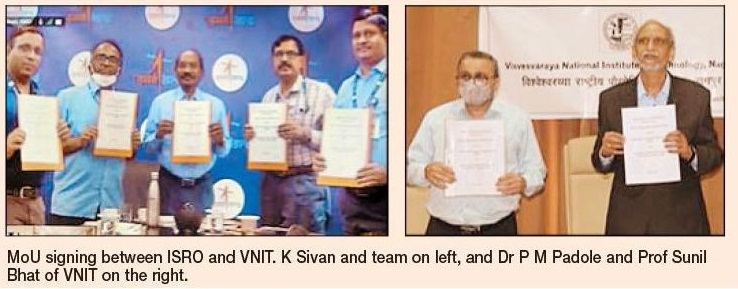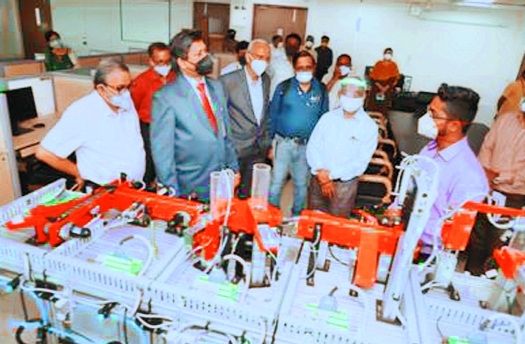ISRO to set up Space Technology Incubation Centre at VNIT, signs MoU
19 Mar 2021 10:03:12

Principal Correspondent :
The Indian Space Research Organisation (ISRO) has launched a Space Technology Incubation Centre (STIC) at Nagpur’s Visvesvaraya National Institute of Technology (VNIT), for the Western Region. In a program that was held on-line, a Memorandum of Understanding (MoU) was signed between Prof P M Padole, Director, VNIT and Dr P V Venkitakrishnan, Director, Capacity Building Program Officer (CBPO), ISRO. The ISRO team comprising Jiwan Kumar Pandit and Nishant Kumar, visited VNIT. Prof. Padole, while interacting with this team along with Director CBPO Dr P V Venkitakrishnan, inspected the facilities at the institute. ISRO team visited all the major departments and reviewed the facilities available at VNIT and interacted with the faculty member and students.
The Space Technology Incubation Centre at VNIT being set up by ISRO, will cover the Western region of the country which will include states of Maharashtra, Gujarat, Rajasthan, Goa and Union Territories (UT) Dadra Nagar Haveli and Daman and Diu. Objective of this STIC is to attract and nurture the young academia with innovative ideas/research aptitude for carrying out research, motivating and supporting them to initiate the start-ups and business in the field of space technology and applications. It also aims at establishing the Academia-Industry eco-system in the whole of the Western region. “S-TIC at VNIT will receive an attractive sum as an annual grant-in-aid as seed money for two years. A major part of the seed money will be utilised for carrying out research activities for the projects undertaken by ISRO. VNIT has provided around 5,000 sq ft floor area on 6th floor of academic block for this purpose. ISRO shall initiate the relevant projects which can be taken up by VNIT.
VNIT shall provide the relevant facilities/laboratories for obtaining solutions. If necessary, high tech test facilities at ISRO will also be made available to VNIT,” informed Prof Padole while talking to ‘The Hitavada’. Dr Sunil Bhat, Associate Professor from Electrical Engineering Department shall be the coordinator from VNIT side for STIC. Prof. Padole emphasised on the efforts taken by the Institute in the last few years to strengthen industry-institute interaction and to create ecosystem for pre-incubation, incubation, start-up projects and R and D activities. The effort has started showing the fruits and in the last three years, institute received 18 patents. The Institute is working on more than 100 R and D projects amounting Rs 55 crore.
Prof. Padole reiterated the institute commitment towards success of S-TIC by involving faculty members, students, alumni and local industries. Umamaheshwaran, Scientific Secretary, ISRO, said, “ISRO has always worked with industries and academia through programs such as RESPOND and STIC as a step to involve students to have their start-ups in space technology having immense techno-commercial potential in future. S-TIC will provide space entrepreneurs and leaders for the future. The sapling which has been planted today has a great potential to grow as tree in future and its fruits will be startups by students.” The MoU signing function started with welcome address by Dr P V Venkitakrishnan, Director, CBPO, ISRO. Prof. P M Padole, Director VNIT, speaking on the occasion, presented the infrastructure and research facilities of the Institute and highlighted the institute achievements. On the occasion, Dr K Sivan, Chairman, ISRO, also released ‘YUKTI-Sanchita 2021’ which contains the list of 108 problems that ISRO wants to be take up immediately. Dr Sunil Bhat, Coordinator, S-TIC; Prof. D R Peshwe, Dean (Faculty Welfare); Prof. J D Ekhe, Dean (P&D); Prof. Dilip Lataye, Dean (Students Welfare); Prof. Abhay Gandhi, Dean (Academic); Prof. Vilas Deshpande, Head, Department of Physics, also were present. Dr Rashmi Uddanwadikar, Associate Dean, conducted the proceedings while Dr Jiwan Kumar Pandit, Associate Director, CBPO, proposed a vote of thanks.

ISRO team during laboratory visit at VNIT.
ISRO, Academia, Industry to solve space technology problem: K Sivan Dr K Sivan, Chairman, ISRO, and Secretary Department of Science (DOS), while speaking in his presidential address, said, “The trio ISRO, Academia and Industry through S-TIC can solve the problems in space technology. ISRO will provide projects of practical relevance on which students can work on to develop proof of the concept. Their testing and validation will also be done using the facilities at STIC and if required from ISRO laboratories. Start-ups at S-TIC can eventually approach INSPACE (Indian National Space Promotion Authorisation and Centre).”